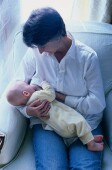Dr. Weeks’ Comment: Corrective Health Care is predicated upon the perpetual observation that, if we could mimic nature, we might be healthier. “It is not nice to fool Mother Nature”, we are warned as kids in TV commercials. And as doctors we are reminded that Nature is a great teacher.
Now let’s consider the question of whether to breast feed or not. All through the 80’s and 90’s we were astonished by the political (economic) stance of the American Academy of Pediatrics was against breast feeding and in favor of the (profitable) position of feeding infants formula food. It was a shameful stance and not based upon good science. So Corrective Health Care doctors are not surprised by this article describing the health benefit conferred upon the breast-feeding mothers nor this article about the lower cancer risks to those kids who were breast fed.
Breast-Feeding Might Cut Risk for Tough-to-Treat Breast Cancer: Study
Researchers found association between time spent nursing and risk of hormone-negative tumors

THURSDAY, Oct. 18 (HealthDay News) — Breast-feeding may reduce a woman’s risk for a form of breast cancer that’s particularly difficult to treat, a new study suggests.
The study, by researchers at Columbia University, found that breast-feeding lowered the odds for estrogen receptor-negative and progesterone receptor-negative (ER/PR-) breast cancer.
These types of tumors have cells that do not carry a protein on their surface that binds to the hormones estrogen or progesterone. This means that they cannot be treated with standard hormone-based therapies.
Since there are few modifiable factors for ER/PR-negative breast cancers, the researchers concluded that women at risk for this type of tumor should be encouraged to breast-feed.
The study is scheduled to be presented Thursday at the annual cancer prevention conference of the American Association for Cancer Research (AACR) in Anaheim, Calif.
“We found an increased risk for estrogen receptor- and progesterone receptor-negative breast cancer in women who do not breast-feed, but in women who have children and breast-feed, there is no increased risk,” study co-author Meghan Work, a doctoral student in the department of epidemiology at Columbia’s Mailman School of Public Health in New York City, said in an AACR news release.
Still, one expert said the findings must be interpreted with caution.
“This was an observational study, and a causal relationship between breast-feeding and the decreased incidence of hormone-negative breast cancer is not established,” stressed Dr. Alyssa Gillego, from the department of breast surgical oncology at Beth Israel Comprehensive Cancer Center, in New York City.
The study involved more than 4,000 women with breast cancer and almost 3,000 women without cancer. The researchers used data from the Breast Cancer Family Registry to examine the link between ER/PR-negative breast cancer and women’s reproductive risk factors, such as the number of children they delivered and whether or not they breast-fed or took oral contraceptives.
The study found that having three or more children but not breast-feeding was linked to an increased risk ER/PR-negative breast cancer.
“Women who had children but did not breast-feed had about 1.5 times the risk for ER/PR-negative breast cancer when compared with a control population. If women breast-fed their children, there was no increased risk for ER/PR-negative cancer,” Work noted. “This is particularly important as breast-feeding is a modifiable factor that can be promoted and supported through health policy.”
They study also revealed that use of oral contraceptives made after 1975 was not associated with an increased risk for ER/PR-negative cancer risk.
Another specialist added, however, that there is a plausible explanation for a connection between breast-feeding and breast-cancer.
“Obviously, the breasts are meant to serve as an organ that produces milk for a newborn,” explained Dr. Stephanie Bernik, chief of surgical oncology at Lenox Hill Hospital, in New York City. “Breasts are in an immature state until one’s first pregnancy. Theoretically, if left in the immature state, breasts are not developing in the manner that nature intended. This altering of what nature intended may be the reason why women that do not breast-feed have a higher rate of cancer.”
There could be other factors, she added. “The lowered risk might also be due to exposure or withdrawal of hormones as one nurses an infant,” Bernik reasoned. “More study needs to be directed to finding out why nursing is protective, as this might lead to new methods of preventing breast cancer development.”
Findings presented at medical meetings are typically considered preliminary until published in a peer-reviewed journal.
— Mary Elizabeth Dallas
SOURCES: Alyssa Gillego, M.D., department of breast surgical oncology, Beth Israel Comprehensive Cancer Center, New York City; Stephanie Bernik, M.D,, chief of surgical oncology, Lenox Hill Hospital, New York City; American Association for Cancer Research, news release, Oct. 18, 2012

